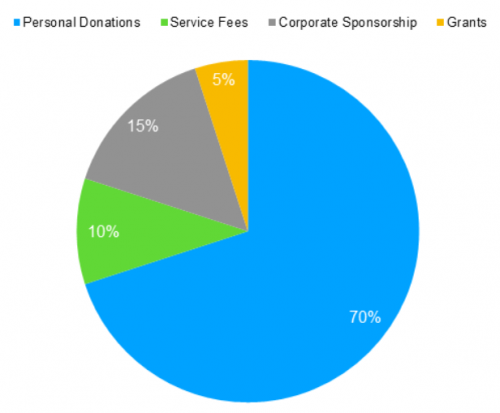Last updated on: May 20, 2025
Starting and building any organization requires money. Large donations may not occur until your organization has trackable success stories and credibility. Until then, nonprofit organizations must engage their Board of Directors, family, and friends to provide fundraising support.
More than 50% of all organizations interviewed in our research study said they need outside help with fundraising. Raising money is one of the biggest challenges all organizations face.
Once the organization’s Charity Registration is approved, any board member or Executive Director’s primary job is asking for donations. Donations are the lifeblood of an organization and the difference between impacting one or two individuals and an entire community.

There are multiple ways to raise funds. Diversifying your fundraising strategy produces the best results because there is no single guaranteed method for donations.
When it comes to raising funds, a well-diversified fundraising plan includes:
- Personal Donations (60-70% of revenue): Receiving individual donations from friends, family, coworkers, and the general public.
- Service Fees (5-10% of revenue): Charging a fee to program participants.
- Corporate Sponsorship (10-15% of revenue): Encouraging local businesses to make monetary or in-kind donations.
- Foundation Grants (2-5% of revenue): Applying for grant funding.

Think of the four items listed above as not just options but also the steps to start soliciting funds. The majority of fundraising always comes from individual donations, so start and focus on enticing people first and foremost.
Next, consider charging service fees if your programming allows. As a charitable organization, you should consider what happens if someone in need of your services cannot afford the service fee. These fees should be reasonable and less than fees charged in a for-profit setting. For example, if you provide groceries for those in need charging the same price at the national chain supermarket down the street is probably not aiding your clients.
Corporate sponsorships are a means of asking local businesses to support your organization. While they might not always provide financial contributions, they may provide in-kind donations of goods or services necessary to operate your organization.
The final step in an organization’s fundraising journey is applying for foundational grants. With few exceptions, most foundations will not consider an application without detailed and successful fundraising from the previous three methods. Further, granting foundations often require multiple years of audited financial records.
Note: Private Foundations do not rely on outside fundraising. The large majority of revenue (greater than 67%) must come from a single, designated source. For more information about Private Foundations, refer back to the explanation earlier in this guide.
As soon as an organization begins accepting donations, it is responsible for properly tracking those donations. Likewise, proper bookkeeping is necessary to maintain accurate records for annual tax reporting. Make sure you have a plan for bookkeeping and yearly financial audits in addition to fundraising.
Fundraising Checklist
- Establish your Board Member Development Plan & Dues
- Ask Friends and Family for Donations
- Online and Social Media Donation Campaign
- Attend Community Events
- Plan A Fundraising Event
- Plan for Program Expenses
- Develop a Plan for Corporate Sponsorships
- Research for Foundation Grants
- Prepare Foundation Grants
- Apply for Foundation Grants
- Manage and Appreciate Donors
- Maintain Detailed Records and Bookkeeping
Ready to launch your nonprofit start-up? Contact us today so we can help you begin your 501(c)(3) the right way. And be sure to check out our awesome reviews!


